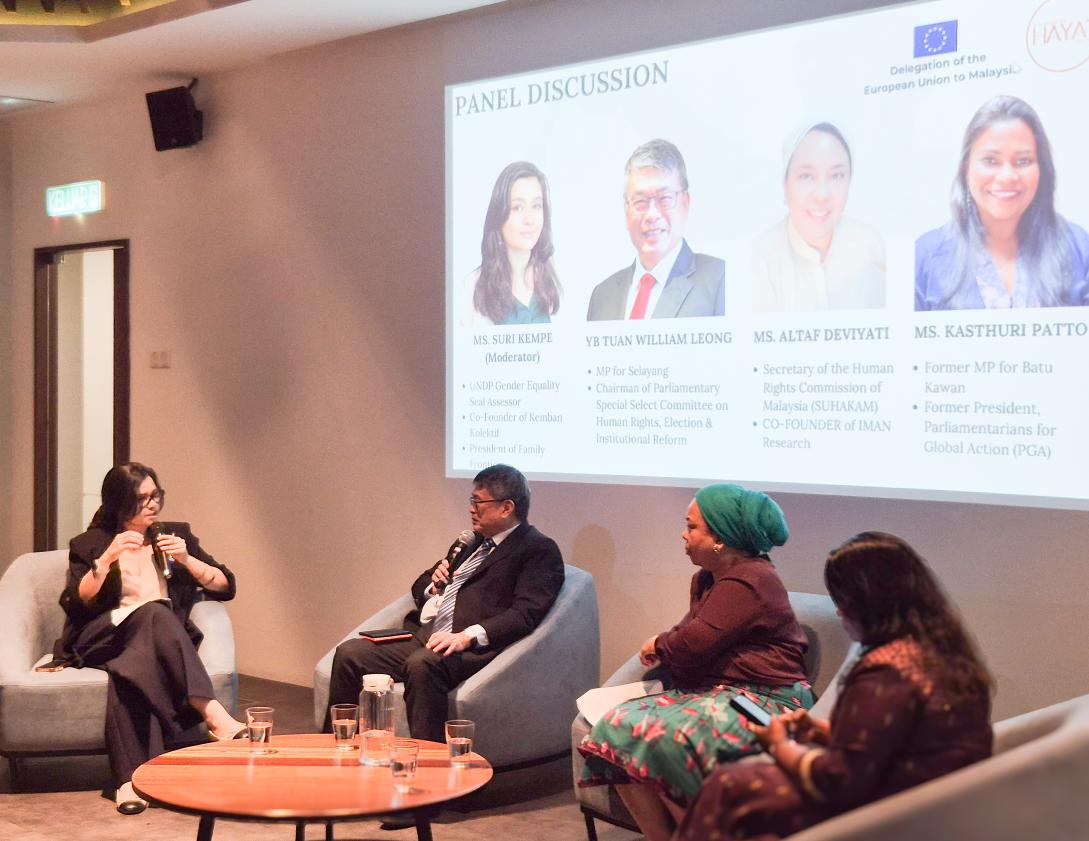The EU Delegation to Malaysia Hosts Event for World Day Against the Death Penalty: ASEAN – A Region in Transition

On October 10, 2024, in conjunction with the World Day Against the Death Penalty, the Delegation of the European Union to Malaysia, in collaboration with HAYAT, and other prominent human rights advocates, hosted an event titled “ASEAN: A Region in Transition - Reassessing the Death Penalty for Drug Offenses” at Co-labs, Naza Tower, Kuala Lumpur.
The event brought together leading experts in human rights, law, and drug policy to discuss Malaysia’s evolving stance on capital punishment for drug-related offenses, focusing on the implications of the 2023 Abolition of the Mandatory Death Penalty Bill on the justice system and human rights. The evening began with welcoming remarks by Ms. Joanna Wasiewska, First Counsellor to the EU Delegation to Malaysia. Ms. Wasiewska emphasised the EU's strong commitment to human rights and its advocacy for the abolition of the death penalty worldwide, setting the tone for the critical discussions that followed.
Mr. Dobby Chew, representing HAYAT, provided the introduction to the discussion by sharing insights on the perception of the death penalty in Malaysia, commenting on the changes in the Death Row Population after the abolition of the mandatory death penalty and explaining how high profile cases can impact public attitudes on this contentious issue. His presentation underscored how legal reforms are impacting societal views, particularly concerning drug offenses. The highlight of the event was the panel discussion, which featured an esteemed lineup of speakers, including YB Tuan William Leong, Chairman of the Parliamentary Special Select Committee on Human Rights, Election and Institutional Reforms and Member of Parliament for Selayang, Ms. Altaf Deviyati, Secretary of the Human Rights Commission of Malaysia (SUHAKAM) and Ms. Kasthuri Patto, former Member of Parliament for Batu Kawan and a prominent human rights advocate. Moderated by Ms. Suri Kempe, the panel delved into the consequences of abolishing the mandatory death penalty, exploring alternative approaches to drug-related crimes and the broader human rights implications for ASEAN nations.
Ms. Altaf spoke on the broader implications of Malaysia's recent legislative reforms, emphasising that while the abolition of the mandatory death penalty marks a significant milestone, it must be seen as a starting point rather than the culmination of reform. She noted that a more comprehensive review of the justice system is necessary, one that involves a holistic approach to addressing drug-related offenses, moving away from punitive measures toward rehabilitation and harm reduction.
Ms. Kasthuri brought attention to the persistent human rights challenges posed by the death penalty, particularly for marginalised groups. She stressed that while the reforms are promising, they must address systemic inequalities that disproportionately affect the poor and vulnerable. Her impassioned remarks underscored the need for continuous advocacy to push for the complete abolition of the death penalty and to ensure that reforms are implemented equitably.
YB Leong focused on the parliamentary perspective, detailing the journey that led to the 2023 Abolition of the Mandatory Death Penalty Bill. He highlighted the role of both domestic and international advocacy in creating the political momentum necessary for reform. However, he cautioned that merely providing judges with discretion is insufficient, as the majority of drug-related cases still result in death sentences, reflecting a deeper need for societal change.
The event concluded with closing remarks by Mr. Charles Santiago, Co-Chair of ASEAN Parliamentarians for Human Rights (APHR). His speech ended with a caution against political manoeuvring that could derail the progress towards full abolition of the death penalty, reminding attendees of high-profile cases like Altantuyaa Shaariibuu.
The evening's discussions were both thought-provoking and inspiring, sparking meaningful dialogue on the future of justice in the region. The lively Q&A session that followed saw participants engage with the panellists on issues of law reform, human rights, and the path forward in creating a more just and humane justice system.
Together, we continue the journey toward the abolition of the death penalty, advocating for a future that respects human dignity and fosters a justice system rooted in compassion and fairness.











